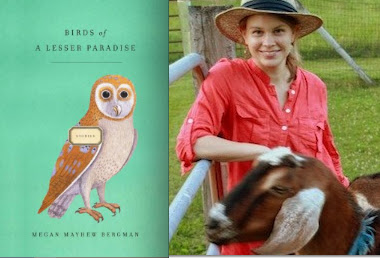What made you want to become a writer?
1. I like storytelling, the license to entertain, and what I will call the “charm of the southern dinner table”—meaning he or she who tells the best stories holds the attention of friends and family. This person, in my case, was my father, who made faces, spoke with maximum inflection, injected humor into everything, and was not above picking up a fork and paddling with it, in order to give color to a story about his first white water rafting trip.
2. I love words. Many southern people I knew growing up understood how to harness the power of language—preachers, prolific swearers, cheerleaders, the guy at the Beacon Drive-In who yells your order (Chili Cheese A-Plenty!)—and this appeals to me: words you like the sound of, words that make you feel something.
3. Sometimes I feel as though I will burst open with ideas, joy, sadness, anger. Writing is an outlet, a way to process what you know or believe to be true about the world. A story is, at times, a hypothesis, a question, an answer.
Where do you find inspiration?
Right now, I’m fascinated with the tension between conviction and practice—the way we (or, more, accurately, I) refuse to match our actions with what we furiously believe. I believe we have overpopulated the world and that the world would be better off without humans; I have two children. I recognize our dependence on foreign oil, and though I drive a Prius, I drive it all over town, day after day. I believe in living simply; I am an avid consumer.
Human righteousness and exceptionalism awe me, the way we often forget we belong to the animal kingdom, that we begin to believe we have transcended it, that simply being human is virtuous.
On a day-to-day basis, I am inspired by proximity to the natural world, by women making non-traditional choices about how they live their lives, by hope and failure.
What obstacles have you encountered in your work, and what have you done to overcome them?
I’ve always been afraid to call myself a writer, to put my work out in public. But I realized that I had so many friends in garage bands, and that I loved hearing them play, and they loved playing. So, in my mind, I was a garage-band-writer. I decided I would write and talk openly about it, I would work constantly at getting better, and that I would be okay if only a limited number of people took pleasure in my work. And then I would let myself dream about “making it.”
So many of them! A matricidal teenager; a hypermuscular female bodybuilder hellbent on revenge; a topless, feminist scooter gang intent on desexualizing the breast. A re-imagining of the last days of the last Carolina Parakeets in captivity—from their perspective. There may have been a talking swamp. Here’s hoping no drafts exist.
 |
| Manual labor |
An old veterinary clinic on my property in Vermont, lined with ’70s veterinary manuals about chinchillas and goat husbandry. There are lots of spiders.
What writer or writers have you learned the most from?
From writer-teachers I had:
• Amy Hempel—How to love the sound of sentences, make every word count, and write about what matters to you.
• Bret Anthony Johnston—How to write the poetry of an ending.
• Nick Montemarano—How to read voraciously while writing; ruthless self-editing.
• George Singleton—How to be generous toward other writers and honor the complexity of the South.
From reading:
• Beryl Markham—How to write stories about women that aren’t Rom-Coms, but feature intelligent, physically-active female protagonists.
• Allan Gurganus—Everything he says here in this interview with Iowa Writers Workshop, particularly about putting texture on the page, and the need to stop being so puritanical about beauty.
What story by another writer do you most wish you'd written?
“The Bear,” by William Faulkner, which is a perfect story/novella/chapter from Go Down, Moses. It’s sublime, organic, compelling, and character-driven while still at home in the natural world.



















